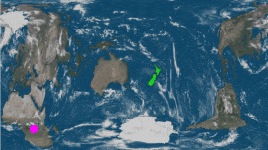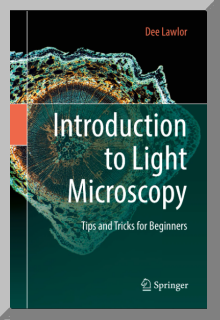There are three fee statuses. Click here for details.
NZ domestic: Currently no fees due to generous support through the Tertiary Education Commission. Without that support, the fee would be over $1800.
International: $2200
Global: Click here for details.
We lend the following to participants without any extra charge. We pay the courier charges when the items are sent to the participant, and when the participant returns the items.
 Textbook: Dee Lawlor. Introduction to Light Microscopy: Tips and Tricks for Beginners. Cham, Switzerland: Springer. 2019.
Textbook: Dee Lawlor. Introduction to Light Microscopy: Tips and Tricks for Beginners. Cham, Switzerland: Springer. 2019.
We will lend a wide range of supplies and equipment for microscope care. (We will also provide some expendable materials for microscope care). A more detailed list will be included here later.
If needed, we can lend a laptop.
Concepts, terminology and principles of light microscopy
How affordability changes the care strategy
Microscope use (without oil immersion)
Oil immersion
Cleaning
Optical trouble-shooting and improvement
Encouraging others to treat microscopes properly
Storage and moving of microscopes
Mechanical trouble-shooting and improvement
Knowing your limits for electrical work
Electrical trouble-shooting and improvement
Determining a microscope’s fitness for purpose (and finding a purpose for which a microscope is fit)
People successfully completing this programme will be able to...
...select the appropriate affordable optical compound microscope for a specific purpose.
...provide maintenance and repairs for affordable optical compound microscopes in a manner appropriate to their use and value.
For an explanation about the nature of the following assessments please click here.
Practical observation
Slide show session
Attestation
- sufficient access to microscopes for practical work,
- NCEA Level 2 (or equivalent), and
- demonstration of understanding of the micro-credential and general suitability for the study through Real World Education's pre-entry process.
All 2025 intakes for this programme are full. If you have an urgent need to take this programme, please apply with the intake code 4002-ASAP. If you are accepted, we will put you on a waiting list to replace someone who withdraws.
The programme can be completed much more quickly if done full time.
Intake 4002-6L Starts 08 Jun 2026 and has a recommended completion before 16 Aug 2026
Intake 4002-6N Starts 06 Jul 2026 and has a recommended completion before 13 Sep 2026
Intake 4002-6P Starts 03 Aug 2026 and has a recommended completion before 11 Oct 2026
Intake 4002-6R Starts 07 Sep 2026 and has a recommended completion before 15 Nov 2026
Intake 4002-6T Starts 05 Oct 2026 and has a recommended completion before 13 Dec 2026
Intake 4002-6V Starts 02 Nov 2026 and has a recommended completion before 10 Jan 2027
Intake 4002-6X Starts 07 Dec 2026 and has a recommended completion before 14 Feb 2027